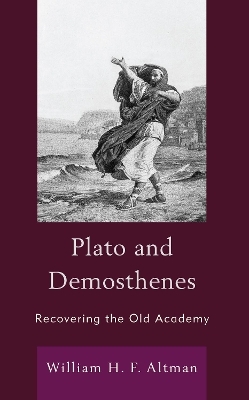
Plato and Demosthenes
Recovering the Old Academy
Seiten
2022
Lexington Books/Fortress Academic (Verlag)
978-1-6669-2005-5 (ISBN)
Lexington Books/Fortress Academic (Verlag)
978-1-6669-2005-5 (ISBN)
In this book, William H. F. Altman turns to Demosthenes—universally regarded as Plato’s student in antiquity—and Plato’s other Athenian students in order to add external and historical evidence for Plato’s original curriculum.
Universally regarded as Plato’s student in antiquity, it is the eloquent and patriotic orator Demosthenes—not the pro-Macedonian Aristotle who tutored Alexander the Great—who returned to the dangerous Cave of political life, and thus makes it possible to recover the Old Academy. In Plato and Demosthenes: Recovering the Old Academy, William H. F. Altman explores how Demosthenes—along with Phocion, Lycurgus, and Hyperides—add external and historical evidence for the hypothesis that Plato’s brilliant and challenging dialogues constituted the Academy’s original curriculum. Altman rejects the facile view that the eloquent Plato, a master speech-writer as well as the proponent of the transcendent and post-eudaemonist Idea of the Good, was rhetoric’s enemy. He shows how Demosthenes acquired the discipline necessary to become a great orator, first by shouting at the sea and then by summoning the Athenians to self-sacrifice in defense of their waning freedom. Demosthenes thus proved Socrates’ criticism of democracy and the democratic man wrong, just as Plato the Teacher had intended that his best students would, and as he continues to challenge us to do today.
Universally regarded as Plato’s student in antiquity, it is the eloquent and patriotic orator Demosthenes—not the pro-Macedonian Aristotle who tutored Alexander the Great—who returned to the dangerous Cave of political life, and thus makes it possible to recover the Old Academy. In Plato and Demosthenes: Recovering the Old Academy, William H. F. Altman explores how Demosthenes—along with Phocion, Lycurgus, and Hyperides—add external and historical evidence for the hypothesis that Plato’s brilliant and challenging dialogues constituted the Academy’s original curriculum. Altman rejects the facile view that the eloquent Plato, a master speech-writer as well as the proponent of the transcendent and post-eudaemonist Idea of the Good, was rhetoric’s enemy. He shows how Demosthenes acquired the discipline necessary to become a great orator, first by shouting at the sea and then by summoning the Athenians to self-sacrifice in defense of their waning freedom. Demosthenes thus proved Socrates’ criticism of democracy and the democratic man wrong, just as Plato the Teacher had intended that his best students would, and as he continues to challenge us to do today.
William H. F. Altman is an independent scholar.
Preface
Introduction
Abbreviations of Plato’s Writings
Chronology
Chapter 1. The End of the Old Academy
Chapter 2. Five Students of Plato
Chapter 3. Plato the Teacher
Chapter 4. Demosthenes
Chapter 5. Suppressions
| Erscheinungsdatum | 15.10.2022 |
|---|---|
| Sprache | englisch |
| Maße | 159 x 236 mm |
| Gewicht | 558 g |
| Themenwelt | Geschichte ► Allgemeine Geschichte ► Vor- und Frühgeschichte |
| Geschichte ► Allgemeine Geschichte ► Altertum / Antike | |
| Geisteswissenschaften ► Geschichte ► Regional- / Ländergeschichte | |
| Geisteswissenschaften ► Philosophie ► Philosophie Altertum / Antike | |
| Sozialwissenschaften ► Politik / Verwaltung ► Politische Theorie | |
| ISBN-10 | 1-6669-2005-3 / 1666920053 |
| ISBN-13 | 978-1-6669-2005-5 / 9781666920055 |
| Zustand | Neuware |
| Haben Sie eine Frage zum Produkt? |
Mehr entdecken
aus dem Bereich
aus dem Bereich
auf den Spuren der frühen Zivilisationen
Buch | Hardcover (2023)
C.H.Beck (Verlag)
20,00 €
Konzepte – Methoden – Theorien
Buch | Softcover (2024)
UTB (Verlag)
39,90 €
Was Pompeji über uns erzählt
Buch | Hardcover (2023)
Propyläen (Verlag)
32,00 €


